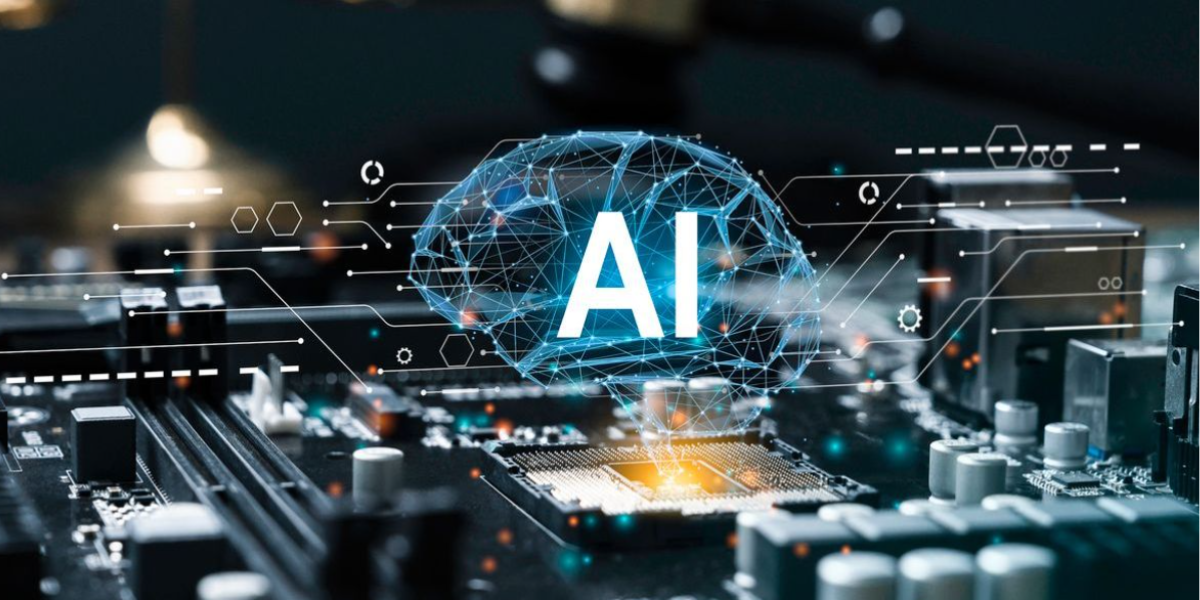From autonomous vehicles to intelligent chatbots, AI has slowly impacted our lives. The technology of the next generation has affected every aspect of our lives and has led to companies using AI apps significantly for their daily business. It is estimated that the AI market is expected to be growing at an annual rate of 37.3 percent over the next seven years. The significant growth indicates that AI As a Service won’t be employed just as a tool to enhance services but as a full service.
The future isn’t a distant dream regarding how AI can transform business. There are many possibilities, from implementing artificial intelligence to boost processes and productivity to applying machine learning (ML) to obtain quality data sets that provide greater accessibility and efficiency.
Using machine learning and AI to improve business operations is now a standard business world across the globe. The technologies are an exciting future for the business landscape and its activities. Some experts warn that firms that haven’t embraced AI may fall behind competitors, and the AI market could exceed $500 billion by 2024.
The progress made in AI advancements provides a wake-up alarm to businesses—they must use AI as a solution or risk falling behind.
What Is AI As a Service?
Artificial intelligence as a Service (or AIaaS) is a third-party solution of AI that allows advanced AI solutions to be easily accessible to businesses using cloud computing. It refers to off-shore tools that enable companies to economically utilize the most effective AI strategies. It is simple to get started, which makes it feasible to test different cloud-based platforms, services, and machine-learning algorithms.
Another significant aspect of AIaaS is that cloud providers can bundle specific hardware and software. For example, computer vision applications require a lot of computational power and hardware, including graphic processing units (GPUs) or field-programmable gate arrays (FPGA). Buying and operating the necessary hardware and software to use AI could be expensive for most organizations. When using AIaaS, a business can access the AI services and all the infrastructure required for its operation.
The Growth Of AI For Business
Since its introduction, AI has enjoyed tremendous success in all business areas. Companies use it to improve efficiency or customize experience; AI has surpassed all limits and has seen a surge in popularity, particularly over the past year. The widespread application of AI in healthcare services, customer support, and software development has been a critical driver of its development. Its ever-changing ability to process AI and the exploding amount of data from significant sources are driving it to cause the AI market to grow.
Improved efficiency and consumption-side impacts can significantly contribute. As technology evolves, emerging markets and AI As a Service Companies will advance by utilizing their artificial intelligence development efforts and initiatives. The increasing ability to create AI applications that can make decisions based on data based upon information they collect from constantly updated sensors will propel the driverless industry to new levels.
Going More
Today, nearly half of US mobile users depend on voice search to navigate their day-to-day lives. The demands of modern life and the ease of convenience with which AI can provide information, as well as suggestions, advice, and recommendations in the field, are prompting AI advancement in the field of voice search to increase.
The skills gap is becoming urgent; 25 percent of organizations are converting to AI implementation to solve the problem. AI software can complete many routine tasks requiring human expertise and speed, helping businesses close the gaps in low-level expertise and allowing skilled professionals to focus on more strategic, high-value work.
Many employees worry that artificial intelligence (AI) could threaten to displace them; the consensus is that the latest AI advancements will create 97 million more job opportunities. This is in contrast to various displacement issues in the workforce, which have also resulted in the rise of roles like AI chatbot designers, deep-learning engineers, and much more. The rapid advancement of AI is attributed to various factors, such as rapid advancements in machine learning, the increase in computational power, and the increasing availability of large amounts of information. A need to boost efficiency and effectiveness is one of the main reasons behind the AI explosion.
Benefits Of AI As a Service
Through the efficient use of AI as a Service, firms can quickly create custom AI solutions that are flexible and scalable. These crucial benefits of AIaaS highlight the essential significance of AI within businesses.
Improved Efficiency And Productivity
One of the main reasons businesses choose AIaaS is to streamline routine and tedious chores. For instance, the AI assistant can respond to typical customer service queries, freeing human employees to tackle more complicated problems. AIaaS increases productivity by taking care of repetitive, tedious tasks, allowing employees to focus more closely on strategic goals.
Easy And Quick Deployment
Utilizing AI-as-a-service is among the most effective ways of introducing AI to an enterprise. The applications of artificial intelligence may not always be identical. Because of this, it can be challenging to create an effective solution suitable for every business. Using customizable solutions is also beneficial for overcoming this issue. With AI solutions, companies can quickly modify these according to their requirements.
Cost Savings
AIaaS can eliminate the need to invest upfront in AI infrastructure and talent. The service provides access to AI applications on a pay-as-you-go basis, which converts fixed costs into flexible operating expenses. Companies save money on data scientist salaries and infrastructure expenses like storage and servers. A scalable consumption model guarantees businesses only pay for what they use.
Scalability
Teams can scale using either up or down when requirements evolve, ensuring that AI tools can keep up with business growth. Instead of providing internal resources, organizations can leverage the flexibility of cloud services offered by AIaaS service providers. This scalability on demand allows for rapid responses to market circumstances.
Access To Advanced AI
With AI As a Service Business Model, businesses can access the latest models and algorithms without hiring AI experts. The providers manage models’ training, optimization, deployment, and training to allow companies to focus on the application rather than its technology. Smaller groups can benefit from the world-class AI utilized by giants such as Google and Facebook.
Different Types Of AI As a Service Platforms
The various AI-based platforms provide different types of ML and AI as a service. They all depend on an organization’s specific business needs and the industry they cater to. Below are some of the most popular forms of AIaaS.
Digital Assistants And Bots
Nowadays, most businesses across all sectors are developing and integrating digital assistants to improve consumer service. Chatbots’ primary function within enterprises is the implementation of advanced functions, such as automating emails, personalizing customers’ experiences, and providing information about the company’s digital footprint.
They employ technologies like natural language processing to understand human speech patterns and provide relevant details to users. AI-as-a-service has become widespread, and most users seek support from bots on the internet instead of human support representatives.
Machine Learning Frameworks
The majority of users rely on machine learning frameworks to create AI models. However, these models are challenging to deploy, and the ML frameworks cannot do this independently. More devices are required when this happens, which is why Artificial Intelligence as a Service can help. AIaaS solutions provided as a Platform-as-a-service (PaaS) model help offer end-to-end machine learning operations (MLOps). AI As a Service Examples, developers can easily create AI models, combine data within them, validate their models, and then publish them for future production in the cloud server.
Application Programming Interfaces
A programmatic interface (API), also known as an API, is a computer application that allows communication between two applications. With just a few codes, app users can access the most powerful AI capabilities that boost apps’ efficiency and functionality.
AI-as-a-service APIs can process natural languages, including understanding sentiment, knowledge mapping, and translation. However, to be able to avail of these innovative services that integrate with top NLP solutions is required. Additionally, AIaaS APIs provide features such as conversational AI and computer vision, which give the user’s face and perform complex tasks, including facial recognition, in-video searches, and object detection.
Code or Low Code ML Solutions
Low code or no software for machine learning provides quick and easy AI-powered options for business. Utilizing custom templates, pre-built models, and no-code applications and instruments, this kind of AI platform as a service can be the ideal choice for companies seeking affordable development tools.
Data Labeling
The most challenging task is categorizing an enormous amount of information and ensuring the quality remains constant throughout the process. Data labeling is a method that efficiently categorizes data using AI and keeps data quality within control. It is an AI-as-a-service option that uses the human-in-the-loop technique, which lets humans and machines continuously interact with one another and aids AI in analyzing information.
Challenges Of AIaaS
Adopting new technology comes with challenges, and AIaaS is the same. Below are some of the most significant challenges that organizations could encounter when they implement AIaaS solutions:
Data Privacy And Security
A major issue is data privacy and security. In the case of AIaaS, businesses hand the data they have to the service provider, who will run it through their algorithms and systems. This raises questions about data governance, compliance, and securing private data. Companies need assurances from suppliers that their data is protected and kept confidential.
Integration Complexity
Integration of AIaaS in the workflows of existing systems may be a challenge. The amount of work required to incorporate will be determined by the AIaaS technology and the structure. API-based platforms may allow for more straightforward integration, while code-free ML systems may require more effort to modify for specific scenarios. IT professionals should determine their integration requirements early.
Vendor Dependence
Using an external vendor to supply crucial AI capabilities results in a dependency that must be controlled. If the company is shut down or drastically alters its strategy and disrupts services, it can be a considerable disruption. Companies should plan to switch vendors should it be required quickly.
Skill Gaps
Although AIaaS eliminates the requirement for in-house AI knowledge, there’s an ongoing learning curve. Workers must be trained to use AI to improve their workflow and interpret the outputs. Without internal training, businesses risk not getting the best value from their AIaaS investment.
Interpretability of Models
Certain AIaaS services are based on Black Box models, which lack transparency in creating forecasts and outputs. The lack of interpretability can make it difficult for users to resolve mistakes or biases. Businesses should find vendors who can provide explanations for models.
Top AIaaS Vendors
There are a lot of tech companies currently offering AIaaS solutions. Below are a few of the leading vendors in this area:
Microsoft Azure
Microsoft Azure offers pre-built AI features like computer vision, speech recognition, and machine learning via SDKs and APIs. Developers can easily incorporate Azure’s AI into their apps. The most well-known Azure AI offerings are Cognitive Services for vision, speech, language, and knowledge.
Amazon Web Services (AWS)
AWS provides a broad range of AI solutions, such as analyzing videos and images and conversational AI using Lex, machine learning using SageMaker forecasting, and other services, such as image analysis. AWS AI services are paid-as-you-go and integrate seamlessly. The most used options include recognition to analyze images and Comprehend for natural-language processing, transcription of speech-to-text conversion, and Forecast for forecasting time series.
Oracle
Oracle Cloud Infrastructure Oracle Cloud Infrastructure offers robust AI solutions for creating, deploying, and maintaining machine learning models that can extract insight and improve predictive capabilities. Important AI offerings comprise data science for model building, OCI data flow for data pipelines, and Oracle AI services for vision and languages.
IBM
IBM Cloud integrates AI into its cloud offerings via Watson APIs, which support Natural Language Processing, speech-to-text, Visual Recognition, and other features. These APIs can be combined with open-source ML frameworks and IBM Cloud services. IBM provides customized solutions, such as Watson Assistant for virtual agents and Watson Discovery for search.
Google Cloud
Google Cloud Platform includes advanced pre-trained AI models that are available through the Vertex AI platform. These are part of Google Cloud’s deep learning capabilities and are fully compatible with AutoML, Kube Flow Pipelines, and other GCP products. The wide range of AI tools, including NLP and speech, vision structure data, and others, help data scientists create and implement effective AI solutions.
Does Your Business Need AIaaS?
The decision of whether your team or company requires the use of an AI as a Service platform will require careful evaluation of your existing processes and capabilities. There are a few essential factors to consider when determining whether AIaaS is the right choice for you.
Analyze Your Workflows
Examine your team’s workflows to find the tasks that are routine or take a long time to complete. Consider whether automated or AI help could enhance any of these processes. Examine whether your workflows use structured inputs for data that can be processed effectively using AI models. In addition, it determines the workflows in which AI can assist in creating new content or creating creative assets to speed up the production process.
Assess Your Capabilities
Assess whether your staff has in-house expertise in AI and machine learning (ML) to develop specific models. If there isn’t, AIaaS platforms offer access to the latest AI capabilities that do not require specialist skills. Consider whether your business needs the most advanced AI features like speech recognition, video analysis, or chat AI, easily accessible through AIaaS services.
Evaluate In-House Skills
Consider whether your team has the skills to build, train, and maintain AI models within the company. If you don’t, AIaaS providers handle these jobs, allowing you to focus on more critical business operations. Consider whether you can effortlessly incorporate AI capabilities into the existing applications and tools because AIaaS platforms typically allow seamless integration.
Consider Costs
Examine the cost of creating AI capabilities internally versus implementing a subscription AIaaS model. AIaaS platforms generally provide enterprise-grade AI capabilities at a lower price than building and maintaining customized AI solutions within the company. Estimate the productivity potential and the potential return on investment (ROI) through AIaaS, as well as how it can improve workflows and the efficiency and gains they could bring.
When you carefully examine your company’s particular needs and consider things like workflow efficiency, internal capabilities, integration requirements, and cost aspects, you can decide whether including an AIaaS platform in your existing tech stack is the best strategic decision. Utilizing the benefits of AIaaS, like the ease of connecting the power of AI capabilities into workflows, may result in significant productivity and efficiency improvements for your company.
Conclusion
With artificial intelligence being used as a service, technology is available to various segments and uses. Its promise of efficiency and productivity enhancements is a boon for all businesses looking to get the most out of this ever-changing technology.
AIaaS offers a variety of benefits to firms, like cost reductions and scalability. It also improves efficiency and enhances customer experiences and access to cutting-edge technology and analytics tools in risk management. As AI advances and makes it easier to access, companies that adopt AIaaS can gain an advantage in the market.

























